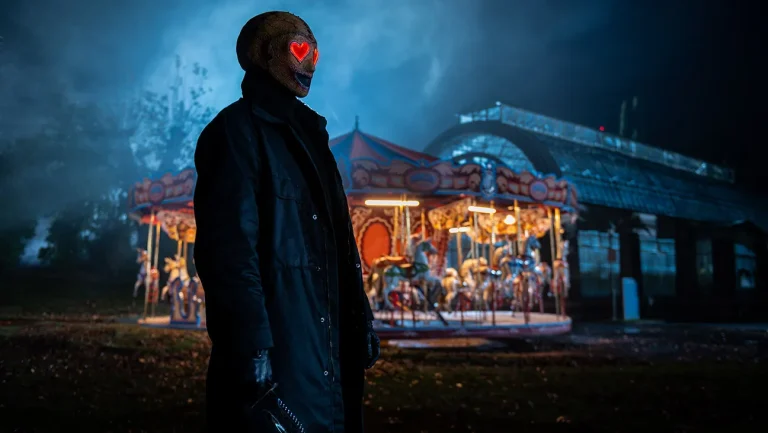Elizabeth Guest’s feature directorial debut, “Let’s Call the Whole Thing Off” (2025), fits snugly in the list of titles that come from a good place. Guest writes, directs, and stars in the leading role of a young, broken-hearted love addict. It means that she desperately craves to be in a relationship at any given point in her life. Her love life dictates her entire self-worth, which makes her prone to some self-destructive habits. So, her journey is bound to break any empathetic person’s heart. Sadly, these elements do not add up to make the film a memorable reflection on this topic.
What it instead becomes is a warm festival-season film that bursts with that lively spirit. It feels like the kind of movie that adult families would want to catch together during the holiday season. There are plenty of reasons why it feels well-suited in that regard. It has that Hallmark-adjacent bright, vibrant quality that Christmas movies tend to have. Forget movies like “Die Hard,” which often come into discussion mainly because they take place around this time. Instead, think of projects like “It’s a Wonderful Life” or “The Holdovers,” which burst with the charm of togetherness.
Guest’s movie is not entirely about the festival, but it has elements that set these projects apart from similar feel-good dramas. It includes a big family gathering event, and the rest of its incidents are geared toward it in one way or another. That’s when the protagonist experiences some major life changes, and, since the event unfolds like an out-of-control trainwreck, the film feels similar to Emma Seligman’s “Shiva Baby.” Guest aims to present a similar anxiety-inducing trip in her character’s life — even if the event itself isn’t inherently tragic as it is in Seligman’s film. To share further similarities, her character, Lydia, also faces dating-related issues as a result of her parents.
In Lydia’s case, the parents are far from being conventionally controlling. Instead, they seem like adorable oddballs who deeply care for Lydia’s well-being. So, it’s not their lack of love but their overbearing nature that contributes to some of Lydia’s emotional qualms. The cast, in those roles, includes Ed Begley Jr., Rachelle Carson-Begley, and the director’s real-life parents, Pamela and Nicholas. They are all more than qualified to pull off a comedic romp as devised in this movie, but it is far from original.

The script turns them into the kind of family figures that may have seemed charming over a decade ago or more. Yet, in the present, their characters seem like stale caricatures who might have done wonders on the screen in the aughts. So, its attempt at screwball comedy feels rather dated. Even then, Lydia’s arc (although predictable) does have a redeeming quality since her problems have debilitating consequences. After all, the movie is about this young woman struggling with self-acceptance, which leads to problems, partially of her own making, which she struggles to find a way out of.
It’s not about Lydia not being able to find a man she would want to be in a long-term relationship with. Instead, it’s about her failure to hold on to any sense of warmth and comfort, as a result of her self-destructive habits. Her skewed self-perception, stemming from unresolved issues related to low self-worth, can be a genuinely paralyzing tragedy. Her journey is potent enough to touch many hearts. That’s why there is something to be admired about its emotional core. Sadly, the intent does not quite cut it for this movie to rise above a sea of similar dramas.
The issue lies in a lack of development beyond the routine narrative threads. Whether it’s Lydia’s painful heartbreak or her struggle in human connection, the movie does not offer anything memorable, instead staying confined to clichéd genre beats. The silver lining in this mess is Andrew Leeds’s performance, which feels far more genuine than everyone else. He plays Tim, the reliable partner that Lydia wants to be with, but struggles to make the relationship work. Leeds’s disarming presence stands out among the cast, since other performances are either redundant or frustrating to sit with.
Even within the film’s festival-adjacent movie category, there are better titles that capture the festive spirit while shaping characters that you would be curious about. Jay Duplass’s “The Baltimorons” is a striking example, besides the aforementioned Alexander Payne movie or Tyler Taormina’s “Christmas Eve in Miller’s Point.” Unlike those films, “Let’s Call the Whole Thing Off” struggles to strike a balance between its humor and heart, leading to a muddled hodge-podge with only a few redeeming qualities.



![8 Thottakkal aka 8 Bullets [2017] – A Flawed yet an Engaging Existential Thriller](https://79468c92.delivery.rocketcdn.me/wp-content/uploads/2017/05/8thottakal--768x432.jpg)

![Mister 8 [2021]: ‘Canneseries’ Review – A Comedic Yet Tense Look At The Practicality Of Polyamory](https://79468c92.delivery.rocketcdn.me/wp-content/uploads/2021/10/Mister-8-Canneseries-768x367.jpg)

![Lucky Chan-sil [2020] Review: A movie producer in an existential fix](https://79468c92.delivery.rocketcdn.me/wp-content/uploads/2020/09/Lucky-Chan-sil-Movie-Review-highonfilms-3-768x512.jpg)
